Ted Chiang Hell Is the Absence of God Read Online
Ted Chiang's Hell is the Absence of God: A Tale of Twisted Conservancy And Mockery
I first came beyond the work of Ted Chiang during an online verse workshop hosted past my University'due south Writer's guild. I was speaking to my former Theatre professor, asking him some recommendations for authors writing in the Fantasy and Science-Fiction genres specifically. He gave me the names of 2 particular Asian authors: Ken Liu and Ted Chiang. Ken Liu is famous for his Dandelion Dynasty series and for coining the term "Silk-punk", which is a genre of Fantasy fiction filled with Asian-influenced bamboo-like engineering science and silk aesthetics.
For Science-Fiction, Ted Chiang is a rather recent writer whose work recently became popular thanks to an adaptation based on his novella, Story of Your Life, in the award-winning 2016 film, Arrival. His stories are especially known for their soulful, melancholic tone matched alongside philosophical questions such as free will, the human status, the implications of artificial intelligence, and even the being of God. I find his approach to the exploration of deep, philosophical ideas in his fiction to be fascinating, virtually specially thanks to his straightforward writing and the emotional tension I can feel seeping through each of his words.
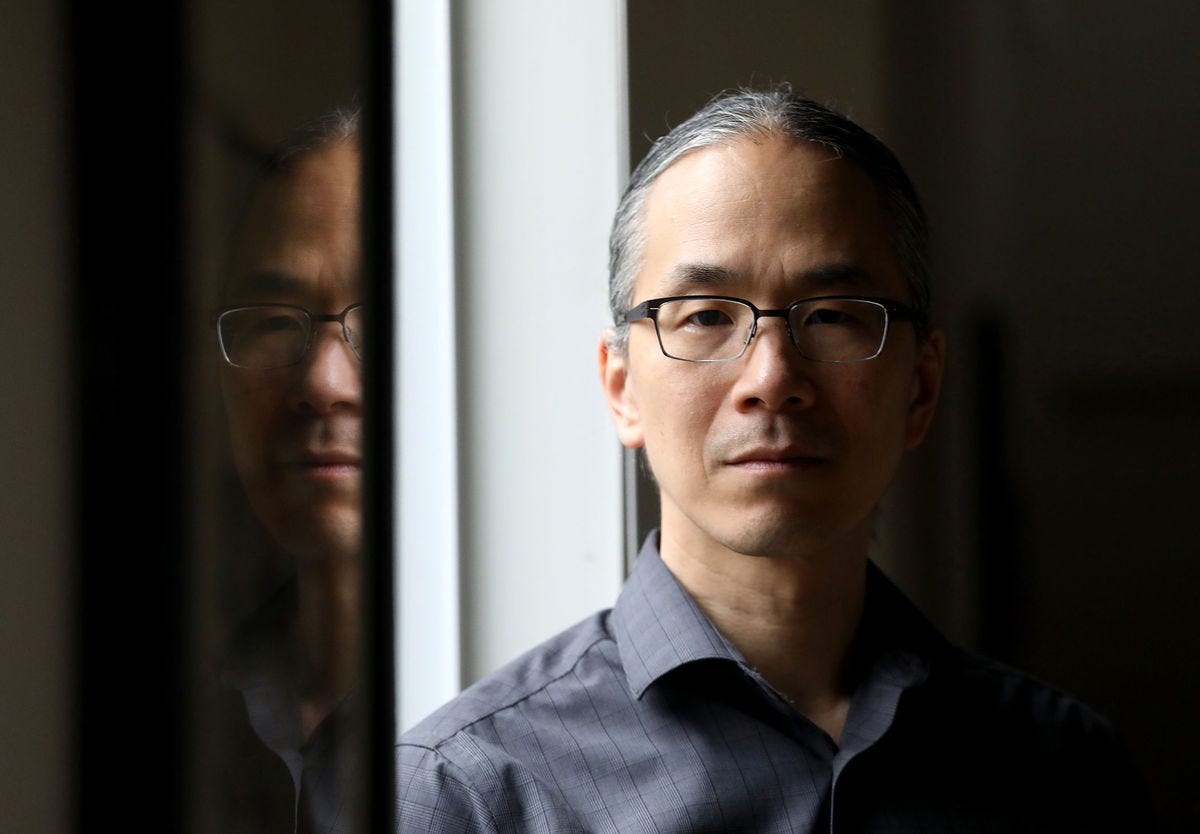
Although I wasn't impressed enough with Inflow to bother reading the source material information technology was based on, I instead went for Chiang's stories that my professor recommended to me such every bit the incredible The Life Wheel of Software Objects novella. Although he has his roots more than inclined to Science-Fiction, Chiang has also delved into the enchanted worlds of the Fantasy genre in stories such as Tower of Babylon, The Merchant, and the Alchemist'south Gate, and Hell is the Absenteeism of God. The third story, Hell is the Absence of God, volition exist the work that shall be discussed here critically.
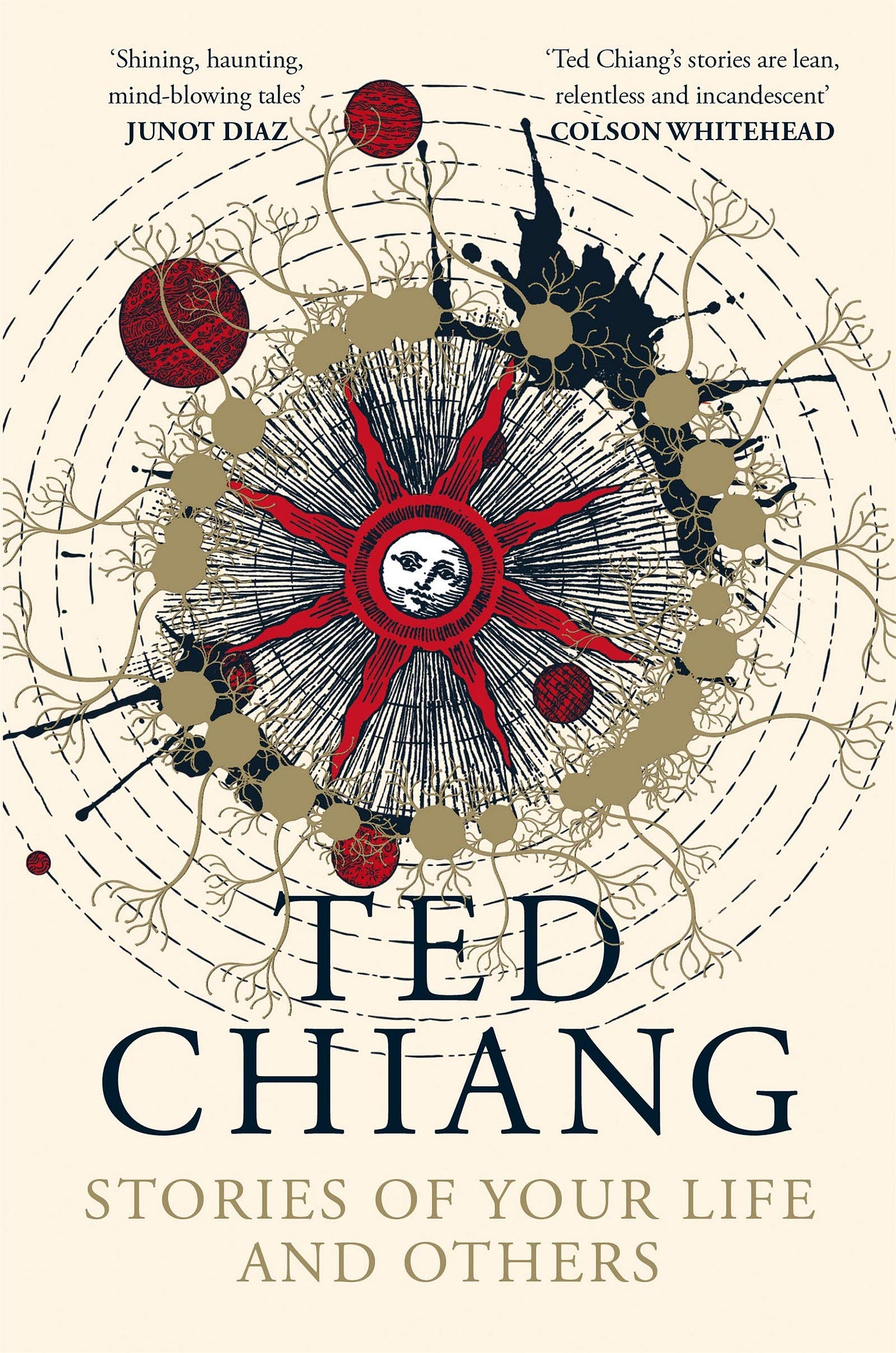
The story revolves around the grapheme of Neil Fisk, an adult man who was born with a genetic disability that acquired his left thigh to exist shorter than his right past several inches, a condition, which his parents blamed God for. From the beginning of the story, nosotros are told that Neil'due south beloved wife, Sarah, perished in an accident involving the visitation of the angel "Nathanael" whose divine burn down acquired the drinking glass of the buffet she was dining in to shatter which caused her to bleed to death. On the other manus, the aforementioned angelic visitation miraculously cured iv ill people of their sicknesses and blinded a Truck Commuter. And though blinded, the Commuter's reaction was not of anger or sadness only of an instant, permanent devotion to God
The rest of the story involves Neil's endeavour to cope with the loss of his wife, as he joins diverse back up groups consisting of unlike people who were negatively affected by the "miracles" sent downwards from Heaven. For much of the story, he is resentful of God for having taken his wife abroad and the disastrous miracles that God keeps on raining down from Heaven.
In his journey to come to terms with his married woman's decease, Neil comes across 2 other characters: the Evangelist, Janice Reilley, and a devotee named Ethan Mead. Janice Reilley was an evangelist who had been born without any legs and despite this, she remained faithful to God and became a public speaker to convince others like to her to exercise the same. That was until a random phenomenon from Heaven restored both her missing legs, allowing her to stand on her own for the very commencement time just ruined her credibility every bit an evangelist. Ethan Mead, who experienced a visitation by the angel Rashiel was bereft of any blessings and sought to find existential answers in the support group where he would first run across Neil.
These two characters would be unsuccessful in convincing Neil to outset loving and believing in God, subsequently causing him to go drastic in longing for his wife and proceeded to do everything to be reunited with her in Sky, even if information technology meant for him to bitterly offset loving God, which he equated to using "brainwashing to cure depression". After hearing most a brief and awfully vague account of a serial rapist and murderer named Barry Larsen "unfairly" existence redeemed and his soul brought to Heaven during his public execution, Neil realized that there is a "loophole" that could get him into Heaven that required him to be selfish by loving Sarah more he did God.
Ultimately, Neil would commence on this journey chasing visiting Angels for an opportunity to speak to God and would perish painfully for doing so, as he slowly bled to death subsequently his truck collided with a boulder. Every bit he died, Janice and Ethan would make it to comfort him, only for God to apply the opportunity to permanently bullheaded Janice with a miracle and spitefully damning Neil into Hell for all eternity. Despite this, Neil grew to love God unconditionally even though he may never exist able to reunite with his beloved married woman for the rest of Eternity.
Objectively speaking, Chiang did a somewhat good job writing this pessimistic short story. The plot was cohesive, the characters were relatable and realistic and I must applaud Chaing's straightforward writing style that made it easy for anyone to read and comprehend his text without much difficulty. The story's structure follows the standard format from start to cease alongside the writer is apt in his power to brand the reader sympathise with his characters. He likewise appears to have either intentionally or unintentionally overlooked several factors inside his story'south narrative which I shall exist discussing later. The author is skilled in making the reader sympathize with his characters and the problems that they undergo and is excellent in providing suitable conclusions to their plotlines.
Another fascinating detail of his story is how he subjects or "materializes" supernatural events such equally the visitations of angels through the usage of meteorology and weather reporting, giving usa some scientific research about how they manifest into the physical world. As much every bit I enjoyed the writer'southward creative approach to his story and religious bailiwick affair, the story's vivid qualities end right there.
Hell is the Absence of God is a story that is written underneath a great deal of creative license and re-interpretation of concepts originally constitute in Christianity. According to the author'southward notes, Chiang states that this story is a response, of sorts, to the Volume of Job and the lessons espoused by information technology and concluded that it lacks "conviction". The story itself is a great departure from the essence of Chore and is re-written and told in the author'due south own perspectives and beliefs.
On page 189 of the story, Chiang has his character, Ethan Mead, in a style alike to Nietzsche's Zarathustra, proclaim to everyone he preaches to that God is not only, not kind, and certainly non merciful equally seen by his careless miracles and the salvation of criminals like Barry Larsen. Such a statement can already give us a articulate hint of how the author would like us to run across God, and maybe is a testament to his personal belief & interpretation of God's actions in the Bible.
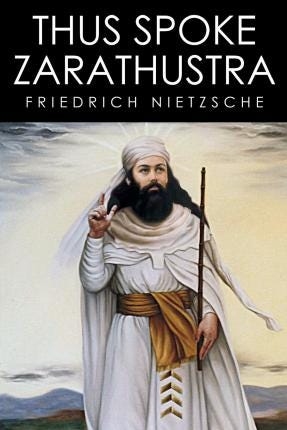
It is very clear to me that the "God" present in Chiang's short story is not the Judeo-Christian God long since worshipped past those two traditions but rather the imperfect "Demiurge" of Gnosticism that possesses a conflated agreement of good and evil, as seen past its careless interventionism through the subversive deportment of its subordinate Angels. Such destructive interventions which Chiang atrociously labels as "miracles", tend to cause more harm than any good which is ridiculous and contradictory in the context of Christianity. I am baffled as to where Chiang might have gained the inspiration to twist and pervert what is otherwise an entirely benevolent gift given by God to the Human race!
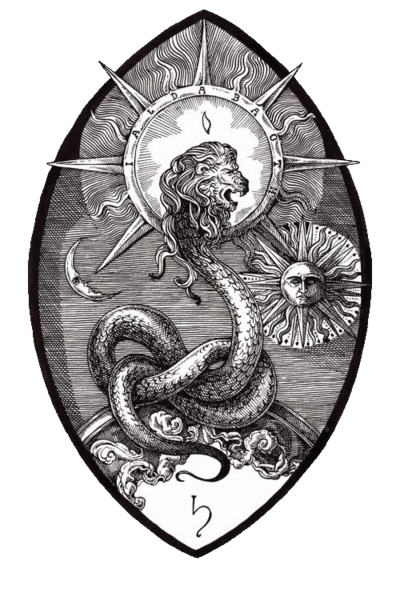
If it actually was the God of the bible being depicted in his story, and then there would be no rampant interventionism, random tragedies, and "miracles" that would simultaneously occur without whatever proper reason. In fact, God wouldn't even need to brand use of his angels if he were to grace us with his miracles! The story of Moses already perfectly demonstrates to united states of america the reasonableness and mercy that God shows to his creations, every bit seen past how Moses was completely unharmed when he encountered the burning bush-league or how he sent the prophet to warn Pharaoh Ramses II multiple times before sending each of his plagues upon the Egyptian people! On my kickoff reading of this story, I had initially believed that the author possesses a very poor understanding of Christianity and its theology, but after much reflection and research, I have a feeling that the author has an adequate understanding of it but is conspicuously biased against it to such an extent that he makes no endeavor to mask his contempt for the religion.
Another grave error in this story is Chiang's approach to the concept of Faith, which he trivializes and disregards throughout the entire narrative of his story. He fifty-fifty metaphorically mocks the whole concept of faith every bit seen past how he depicts the "bullheaded ones" who are a group of fully devoted people that were robbed of their eyesight after receiving a miracle from Heaven. Indeed, Chiang is and so myopically blinded with his dismissal of organized religion and devotion every bit "blind", that he overlooks a crucial item within the narrative of his own story which cemented the raison d'être of his protagonist: the salvation of the criminal Barry Larsen.
For an author who is thorough in wrapping up the plotlines of each of his characters, Chiang gives us a vague and superficial account of the aforementioned Barry Larsen, whom the author insists was wrongfully brought into Sky by God regardless of his past crimes. In his attempt to portray "God" equally some kind of evil, unjust deity that does whatever he pleases, the writer neglects to provide to u.s. the small just very important detail that led to the salvation of this terrible murderer. Information technology was from this observation alone that I have concluded that Chiang does not treat his subject field thing seriously and clearly possessed a poor understanding of Christianity.
If you really call up nearly information technology, it was not at all wrong for God to have rescued such a terrible criminal, despite Chiang's drastic insistence that we consider otherwise. Now before you lot charge me of annihilation, let me present to you lot an analogy from a truly superb work of fiction and poetic mastery. In Dante Alighieri'southward Purgatorio, the 2d book of his renowned Divine Comedy trilogy, Dante and Vergil encounter the graphic symbol of Buonconte Da Montefeltro, who in life was a general for the Ghibelline faction that fought against the Guelphs during the Investiture Controversy in 12th century Europe. Like his father, Buonconte was a human who led a sinful life and he was killed during the Battle of Campaldino in 1289 against the Guelphs, with his body never being recovered.
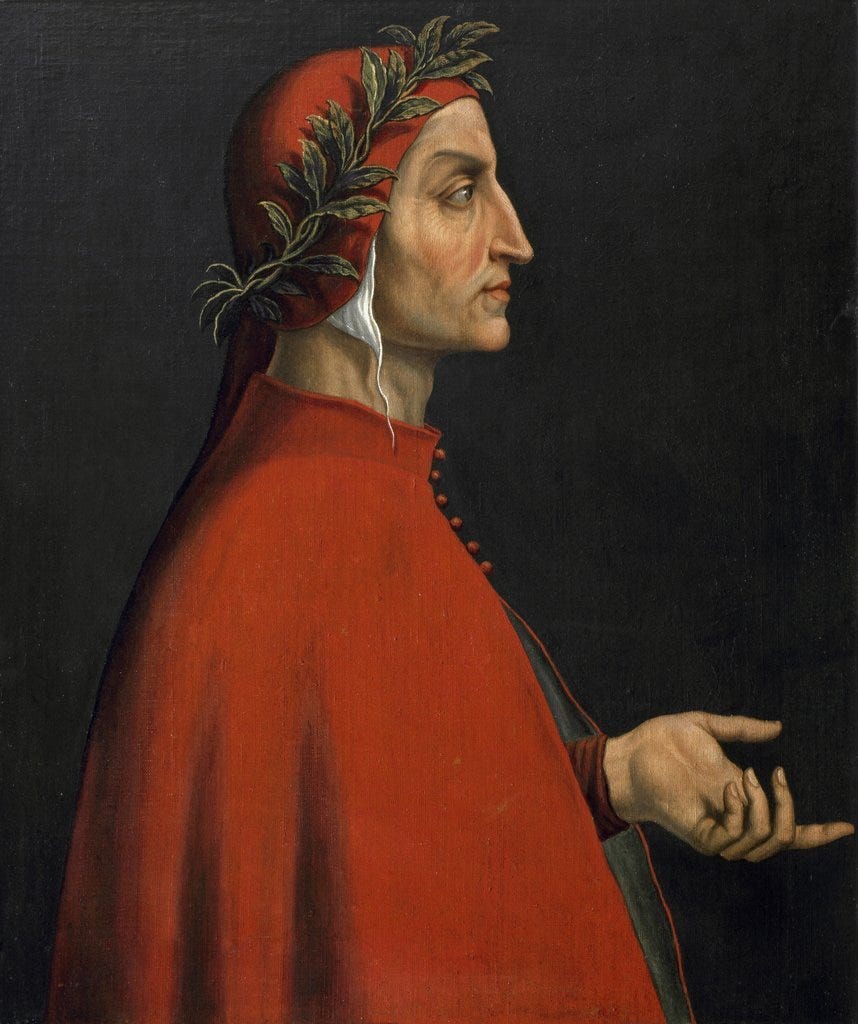
Dante narrates to united states of america equally he meets Buonconte in Purgatory that he was fatally injured at the throat and collapsed in a nearby river. Equally he lay dying, Buonconte pleaded to the virgin Mary past calling out her name, his soul immediately being rescued by an Angel who would bring him into Heaven. Meanwhile, the Demon that had arrived to drag the sinful man's soul into the Inferno was angered and destroyed his body by unleashing a tempest that swept it into the river. It is important to note that the imagery of Buonconte's trunk being swallowed by the river is symbolical of the Christian rite of Baptism, implying to us the character's ultimate conversion.
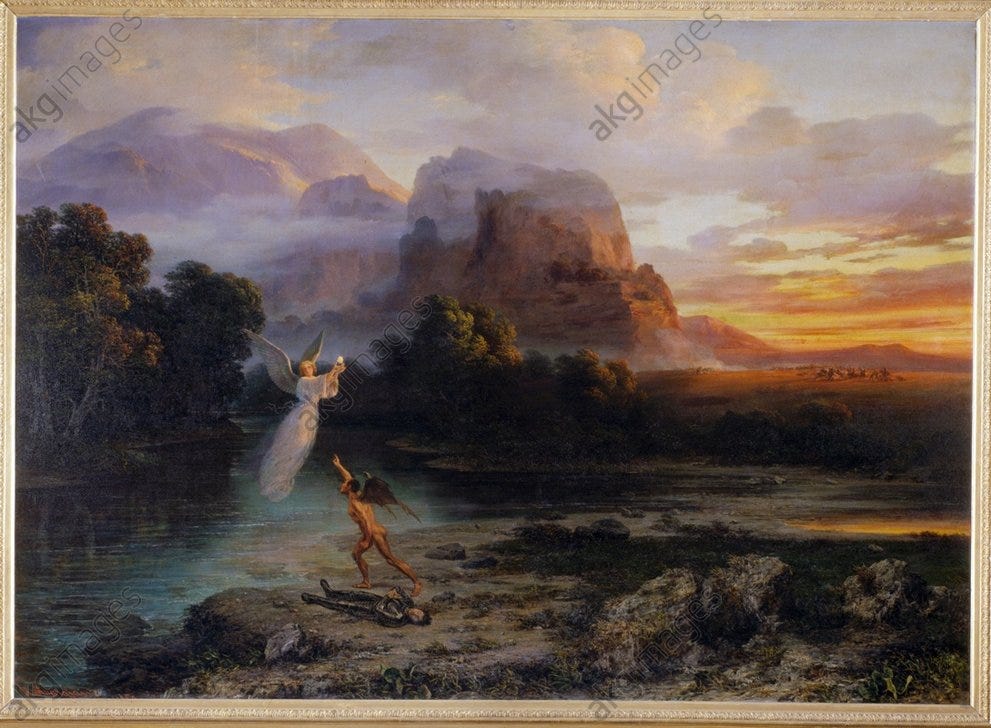
Now, why was Buonconte, a sinful man built-in of an equally sinful father, just all of a sudden forgiven and saved by God for merely uttering the proper noun of the Virgin Mary in his final moments? People with the same level of understanding of Christian doctrine like Chiang may never sympathize this, but the respond to this question is very unproblematic. Because, unlike his father, Guido, who was an ex-war machine strategist that became a Monk later in life, Buonconte was sincere in his conversion and the penance for his sins. He did non adopt the guise of a Monk and advised the Pope of a deceptive scheme in providing his enemies a false amnesty! When Guido proved to God that he was pitiful for the sins he committed in his life, he instantly forgave him for all his sins (such is his authority to practice so) and brought him into Purgatory, to properly cleanse himself of them to enter Paradise.
Disregarding the fact that Ted Chiang's execution of literary symbolism is inferior to that of a 13th century Poet, let the states at present return our attending to the character of Barry Larsen whose sinful soul was "wrongfully" saved by God during his public execution in front end of his victims' families. If you were to follow Chiang's "rationalistic" nonetheless ignorant logic in the narrative, the supposedly idiotic God ought to accept condemned him regardless of whether he was lamentable or non. Just if you lot were to follow Dante'southward proper understanding of conservancy, God would've showtime listened to the heart of Larsen and best-selling whether or not he is worthy of being saved. And in the occurrence that Larsen does admit the gravity of his sins and begs forgiveness with utmost sincerity, so that is enough for God to rescue the man's soul from eternal damnation.
Maybe the reason why Chaing chose to keep this grapheme'due south story cursory and superficial (in happenstance that he was enlightened of such a detail) were because any further prying into the character would completely undermine the narrative he was trying to push, which is without whatsoever incertitude, to portray God as this evil and unjust deity and that we are all better off beingness bleak Atheists similar himself. To give Larsen whatever hint of sorrow or regret for his sins, much less any ways to beg for forgiveness, would quite literally cause Chiang'south misguided narrative to collapse on itself much like a building insufficient of its foundations.
Unfortunately, the writer's mire of errors does not stop with the decision of his contemptuous story. Equally mentioned earlier, Chiang explains to us his personal thoughts about the story he wrote and the footing for which he wrote information technology. He tells the reader that the story is a response to the book of Job in the Bible and how he finds a discrepancy in the author'south moral teachings concerning the character of Job and the incredibly unfair penalization that he received from the Devil, a character surprisingly absent from Chiang'due south story! Chiang argues that the bulletin of Job's story is "undercut" and "lacking the courage of its convictions", pointing out that one of the messages of the story is that "virtue isn't always rewarded" and that God's rewarding of Chore contradicts the point of this message.
Having read the Book of Job myself and seeing the divine sublimity of its themes and moral teachings, I can say for certain that Chiang's myopic reading of Job's story misses the other more crucial themes of the story which are Faith and Gratitude. Job'south Gratitude is displayed perfectly at the offset of the tale when he, the most blessed human being on Earth, remains humble, thankful, and grateful for all the blessings that had been given to him and his family. Like his ancestors earlier him, he e'er offered sacrifices to God atop his altar to give thanks him for the blessings he continues to receive.
The Devil, seeking the ruination of Job and his complete separation from the Lord, challenges the Creator to permit him destroy Job'south life to test his Religion. The Lord agrees on the condition that Task'due south life will never exist harmed. What proceeds next is a serial of utterly devastating events ranging from the loss of Task'southward business concern and the death of all his children, who were all adults at the time. Job remained unwavering in his faith in the Lord, prompting the Devil to unleash one final plague upon him in the form of a terrible and painful disease. He would spend several days in the desert, accompanied merely by his four close friends, three of which would dubiousness him and accuse him of some secret wrongdoing in a style akin to how the Devil did earlier.

It was simply Elihu, the fourth friend, that sided with Job and believed in his spiritual cleanliness and unwavering faith in the Lord. Upon realizing the reason behind God's supposed silence, Job falls to his knees once again and pronounces his connected Faith to God, who then finally speaks to him directly in what is the longest corporeality of dialogue ever spoken by God in the entire Bible! He asks Chore a multitude of different questions that he can never answer, demonstrating to him the space vastness and dazzler of the Lord's power and creation. The story culminates with Task agreement three important virtues that God wishes to impart with him: Faith, Gratitude, and Humility.
Job embraces these virtues and abandons his inward pride and is forgiven by him for doing then. God and so scolds Chore's 3 doubting friends, whose flawed understanding of God led them to disregard both his mercy and authority. Chiang is ignorant to these elementary facts too and as such he implies that God's reward for Chore is an error and suggests to the reader an alternate catastrophe of pathetic bleakness where Job remains "bereft of everything." Such a dreadfully depressing tone is characteristic of many of Chiang's stories and is akin to Schopenhauer'south pessimistic philosophy.
Much like Job'southward iii wrongful friends, I suspect that 3 things were going through Chiang's mind in his reading of Job and the writing of his story: Doubt, Skepticism, and Unbelief. Indeed, Chiang is himself a professed Atheist equally he said and then in a 2002 interview. With this in mind, information technology is no surprise to anyone apart from Atheists that Ted Chiang possesses a wrongful interpretation and understanding of the Book of Task, and God, for that matter. I could simply imagine the surprise on Chaing's face when he first discovered that God rewarded Chore tenfold for his unwavering organized religion in the struggle that he endured, his dead children even existence replaced with new ones! Although Chiang is correct in proverb that new children tin can never replace dead ones (since Man life is irreplaceable), to sympathize why Job accepted all of God's gifts unconditionally is to empathize the virtue of gratitude.
To conclude, it appears to me that when he first wrote this story, Ted Chiang did not simply neglect to understand the book of Job, only he also lacks a keen understanding of organized religion, Christianity, God, and even religion, for that matter. Considerately, the story is well written, like shooting fish in a barrel to read, understand and contains a straightforward plot with mostly relatable characters. If nosotros disregard the indicate I made nearly Barry Larsen, the story would be an excellent narrative from kickoff to finish. Thematically, withal, the story is absolutely lousy and pathetic. It was clearly written from a very skewed, biased, and ignorant agreement of the Christian organized religion and I would consider Chiang to be about every bit versed in this subject matter equally Ozzy Osbourne. I would kindly advise that Chiang steer clear of such nonsensical rambling and stick to doing what he does best: writing science-fiction.
grazianohavol1937.blogspot.com
Source: https://medium.com/@funkyboy/ted-chiangs-hell-is-the-absence-of-god-a-tale-of-twisted-salvation-and-mockery-2c021816c666
0 Response to "Ted Chiang Hell Is the Absence of God Read Online"
Post a Comment